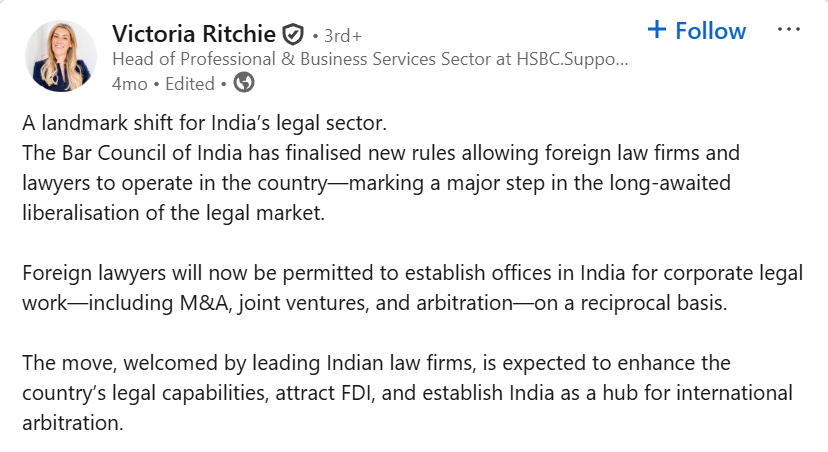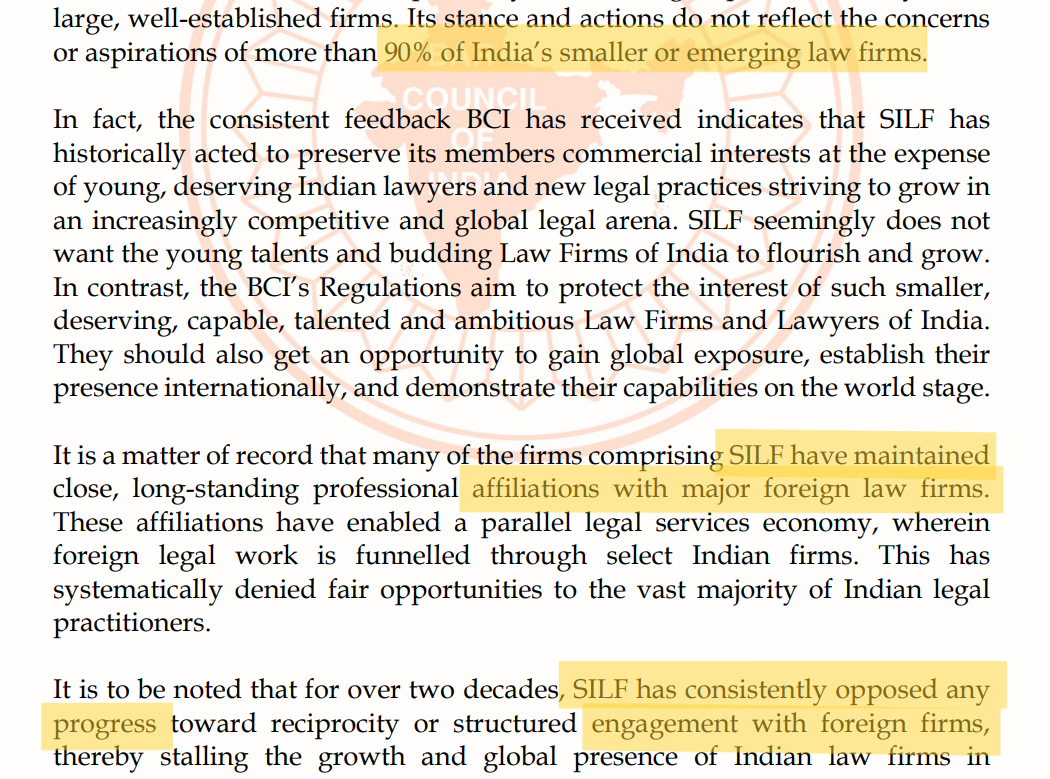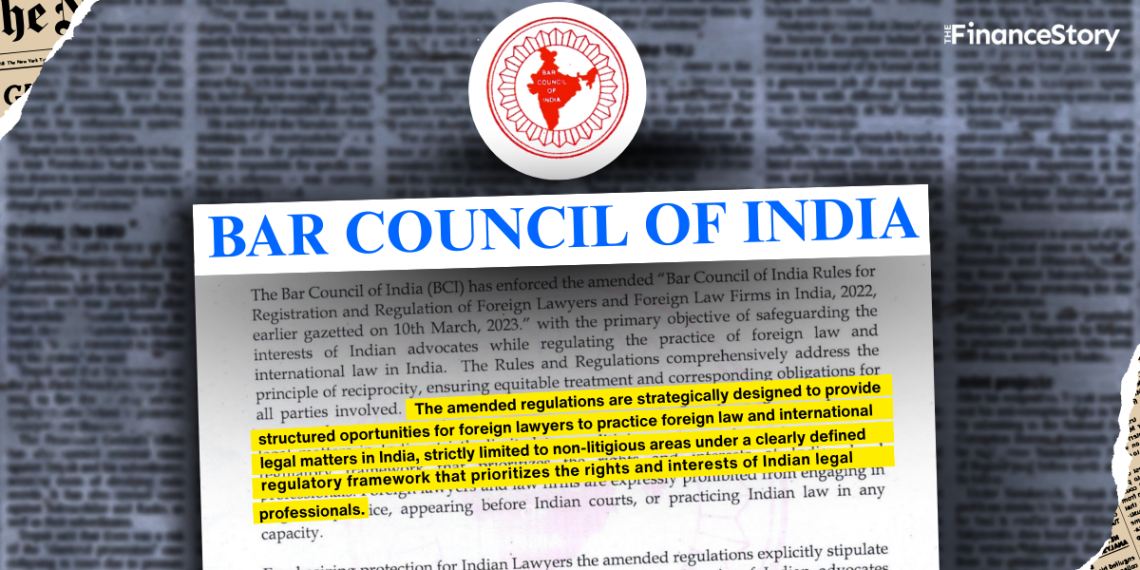- India’s $45.2 billion legal market has been closed to foreign law firms for decades.
- But, for the first time in history, foreign lawyers and law firms will be allowed to practise in India, as per the decision of the Bar Council of India on May 14, 2025.
- There’s a twist: they come with heavy restrictions.
- So, why this shift? And what does it mean for India’s lawyers?
What is happening?
For years, Foreign law firms could only fly in and fly out for short-term advisory work…But it could not set up offices or hire locally!
But this changed on May 14, 2025, when the Bar Council of India (BCI) announced a landmark decision: foreign lawyers and law firms will finally be allowed to practise in India.
A first draft of these rules came out in 2023, but got stalled after objections from Indian firms.
This time? The Council went full steam ahead.
What Foreign Firms can & can’t do
-
Cannot: Practice Indian law, appear in Indian courts, or handle property conveyancing.
-
Can: Advise on non-litigious work involving foreign law, cross-border contracts, and international arbitration (with a government NOC).
BCI is emphasising that Indian law is off-limits to foreign firms.
Entry requirements
To operate in India, foreign lawyers and law firms must:
- Obtain a No Objection Certificate (NOC) from the Indian government
- Register with the BCI, providing:
- Proof of foreign legal qualification
- A letter of good standing from their home jurisdiction
- Evidence of reciprocity (i.e., their home country must allow Indian lawyers to practice there)
- A completed application form and payment of applicable fees
For short-term visits under the “fly-in, fly-out” model:
- Lawyers must notify BCI before arrival
- Disclose client details and stay duration (critics say this could breach confidentiality and ethics!)
- Stay capped at 60 days per year (seen as unrealistic for handling complex cross-border transactions)

But why the shift now?
India’s Arbitration ambition
This move signals India’s push to be a global arbitration hub.
Now, foreign firms can handle international arbitration in India, refer Indian law matters to local advocates, and partner seamlessly with Indian lawyers.
BCI wants Reciprocity
Indian citizens are allowed to practice law in several countries, i.e., on a reciprocal basis.
BCI says, “If Indian lawyers can set up abroad, why shouldn’t foreign lawyers get a (regulated) entry here?”
Form global partnerships
Some Indian law firms have already collaborated with global players through strategic partnerships and tie-ups.
- IndusLaw + CMS (UK): Partnership to strengthen cross‑border advisory and international arbitration capabilities.
- AZB + Clifford Chance: Collaborative/referral ties for international transactions and global best practices.
- Trilegal + Allen & Overy: Non‑exclusive referral agreement for cross‑border client work.
- Clyde & Co + ALMT Legal: Tie‑up for insurance and dispute resolution work, enabling local‑global collaboration.
And of course, it will upgrade processes, training, and technology to meet global best practices.
And yes, breaking the Monopoly of “Big Law Firms”
According to the Bar Council of India, for decades, a handful of elite Indian law firms in groups like the Society of Indian Law Firms (SILF) had informal tie-ups with foreign firms, funnelling cross-border work to themselves.
These elite firms dominated international work…Smaller and younger law firms were locked out!
Now, BCI’s new rules democratize access:
-
Mid-sized & Emerging firms can compete for cross-border work.
-
Big law firms face new competition at the top end of corporate and arbitration deals.
-
Clients gain more choice and better pricing.

There are roadblocks
- Local pushback: Small and mid-sized Indian firms fear being priced out. Even SILF (elite law firms) opposed the foreign law firms’ entry!
- Fear of Talent Wars: Foreign firms could lure top lawyers away from domestic players, especially in Tier 2 and Tier 3 cities.
- Price wars: Large global firms with deeper pockets could undercut Indian firms, squeezing mid-sized practices.
- Regulatory grey areas
- Steep entry costs: Registering in India isn’t cheap; firms must pay $25,000 upfront plus a $30,000 security deposit.
Big worry: Big Law domination?
Big 4 (EY, PwC, KPMG, Deloitte) entered India and reshaped the Accounting, Audit, Advisory industry!
Can Big Law firms (like Baker McKenzie, Clifford Chance, DLA Piper, Dentons) enter India and change the legal game, forcing Indian firms to adapt or compete differently?
Wrapping up…
The Indian legal services market generated a revenue of USD 45.2 billion in 2024 and is expected to reach USD 67.4 billion by 2030.
Foreign law firms entering India won’t just affect lawyers; they’d ripple into corporate finance, tax, compliance, and strategic decision-making.
CFOs and CA firms need to know how deals, fees, governance, and cross-border risks are changing.
FAQs:
What is The Society of Indian Law Firms (SILF)?
The Society of Indian Law Firms (SILF) is an apex body comprising approximately 125 top law firms in India
Examples of prominent firms
- Amarchand Mangaldas/Shardul Amarchand Mangaldas
- AZB & Partners
- Luthra & Luthra
- J. Sagar Associates
- Lakshmikumaran & Sridharan
- Khaitan & Co
- Nishith Desai Associates
What is the Bar Council of India (BCI)?
The BCI is the Indian regulatory body for the legal profession and sets the rules for foreign law firms and lawyers practicing in India.







